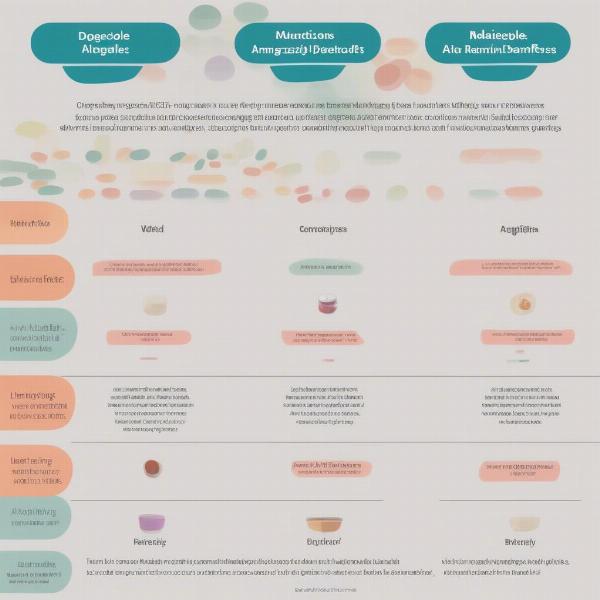Pepcid (famotidine) can be a helpful medication for dogs experiencing certain stomach issues, but determining the correct pepcid dose for dogs by weight requires careful consideration. Using a pepcid dose for dogs by weight chart calculator can simplify this process, but understanding the underlying factors is crucial for responsible pet ownership. This article will delve into the use of Pepcid in dogs, exploring dosage guidelines, potential side effects, and safe practices.
Understanding Pepcid for Dogs
Pepcid, also known by its generic name famotidine, is an H2 blocker that reduces stomach acid production. It’s often prescribed by veterinarians to treat conditions like gastritis, ulcers, and acid reflux in dogs. While a pepcid dose for dogs by weight chart calculator can be a convenient starting point, it’s essential to consult with your veterinarian before administering any medication to your dog. They can accurately diagnose the underlying condition and determine the appropriate dosage based on your dog’s specific needs.
Calculating the Correct Pepcid Dosage for Your Dog
While a pepcid dose for dogs by weight chart calculator can provide a general guideline, it’s important to remember that these calculators are not a substitute for professional veterinary advice. Dosages can vary based on the severity of the condition being treated and your dog’s individual health status. Generally, the recommended dose is 0.25-0.5 mg per pound of body weight, given every 12-24 hours. For example, a 20-pound dog might receive 5-10mg of Pepcid. However, only your veterinarian can determine the exact safe and effective dose for your dog.
Potential Side Effects and Precautions
Pepcid is generally considered safe for dogs when administered under veterinary supervision. However, like any medication, it can have potential side effects. These can include:
- Loss of appetite
- Lethargy
- Vomiting
- Diarrhea
If you observe any of these side effects after administering Pepcid, contact your veterinarian immediately. It’s also crucial to inform your vet about any other medications your dog is currently taking, as interactions can occur. Never give your dog Pepcid AC, as it contains additional ingredients that can be harmful to dogs. Always use the regular strength Pepcid or the generic famotidine tablets.
When to Seek Veterinary Care
While Pepcid can provide relief for some stomach issues, it’s essential to seek veterinary care if your dog is experiencing persistent or severe symptoms. Conditions like vomiting, diarrhea, loss of appetite, and abdominal pain can indicate a more serious underlying problem requiring prompt veterinary attention.
Alternatives to Pepcid
Several alternatives to Pepcid can be used to manage stomach acid in dogs. These include other H2 blockers like ranitidine (Zantac) and proton pump inhibitors like omeprazole (Prilosec). Your veterinarian can help determine the most appropriate medication for your dog’s specific condition.
 Alternatives to Pepcid for Dogs
Alternatives to Pepcid for Dogs
Conclusion
Understanding the proper pepcid dose for dogs by weight is crucial for responsible pet ownership. While a pepcid dose for dogs by weight chart calculator can be a helpful tool, it’s essential to consult with your veterinarian for an accurate diagnosis and personalized dosage recommendations. By working closely with your vet and monitoring your dog for any adverse reactions, you can help ensure their safety and well-being.
FAQ
- Can I give my dog Pepcid AC? No, Pepcid AC contains additional ingredients that are harmful to dogs. Only give your dog regular strength Pepcid or generic famotidine.
- How often can I give my dog Pepcid? The frequency of Pepcid administration depends on your dog’s specific condition and should be determined by your veterinarian.
- What should I do if my dog experiences side effects from Pepcid? Contact your veterinarian immediately if your dog shows any adverse reactions after taking Pepcid.
- Can I crush Pepcid tablets for my dog? Yes, you can crush Pepcid tablets and mix them with food to make it easier for your dog to swallow.
- Is Pepcid safe for all dogs? Pepcid is generally safe for dogs when administered under veterinary supervision, but certain breeds or dogs with pre-existing conditions may be more susceptible to side effects.
- What are the signs of stomach upset in dogs? Common signs include vomiting, diarrhea, loss of appetite, lethargy, and abdominal pain.
- What are the long-term effects of Pepcid use in dogs? Long-term use of Pepcid should be monitored by a veterinarian, as it can potentially lead to vitamin B12 deficiency in some dogs.
About ILM Dog: ILM Dog is your trusted resource for comprehensive dog care information, offering expert advice on breeds, health, training, nutrition, grooming, and much more. We are dedicated to providing practical and reliable guidance to dog owners worldwide. For expert advice tailored to your dog’s needs, contact us at [email protected] or +44 20-3965-8624. Visit us at ILM Dog for more valuable resources and expert insights.